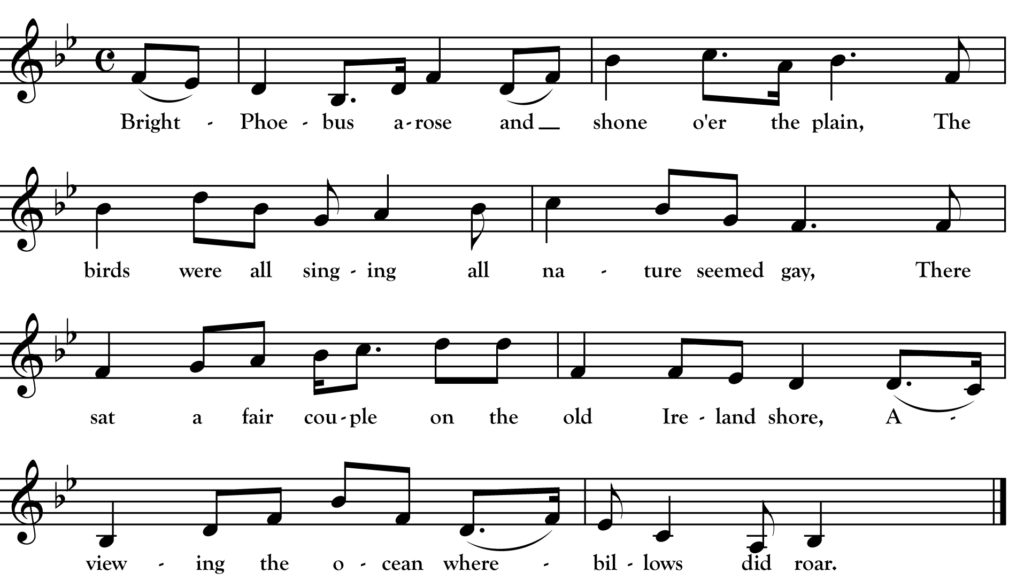The Lady Leroy

Bright Phoebus arose and shone o’er the plain,
The birds were all singing, all nature seemed gay,
There sat a fair couple, on the old Ireland shore,
A-viewing the ocean where billows did roar.
“Fair Sally, fair Sally, the girl I adore,
To go away and leave you, it grieves my heart sore,
Your father is rich and is angry with me,
And if I longer tarry, my ruin he’ll be.
She dressed herself up in a suit of men’s clothes,
And to her old father disguised she did go,
She purchased a vessel, paid down his demands,
Little did he dream ’twas from his own daughter’s hands.
She went to her true love and unto him did say,
“Make haste and get ready, no time to delay,
Make haste and get ready, let bright colors fly.”
And over the ocean sailed the Lady Leroy.
And when her old father came this to understand,
He swore his revenge on that worthy young man,
Saying, “My daughter Sally shall never be his wife,
And for her disobedience, I’ll take her sweet life.”
He went to his Captain and unto him did say,
“Make haste and get ready, no time to delay,
Make haste and get ready, let bright colors fly.”
He’d sworn by his maker, he’d conquer or die.
They scarcely had sailed past a week or ten days,
When wind from the southeast it blew a fine breeze,
They saw a ship a-sailing, which filled them with joy,
They hailed her and found ’twas the Lady Leroy.
They bade them return unto old Ireland’s shore,
Or broadsides of grapeshot among them they’d pour,
But Sally’s true lover he made this reply,
“For the sake of fair Sally I’ll conquer or die.”
Then broadside for broadside most furiously did pour,
And louder than thunder, bright cannon did roar,
At length the Irish beauty, she gained the victory,
Hurrah for the sons of sweet liberty!
We close out 2022 with one more that was part of Michael Dean’s repertoire. Dean printed his version of “The Lady Leroy” in his 1922 songster and sang it for collector Franz Rickaby in 1923 and, again the next year for collector Robert Winslow Gordon. From Rickaby’s brief notes we know that Dean learned it from his mother Mary McMahon Dean (1821-1907) who emigrated to Smiths Falls, Ontario from County Mayo in about 1842 (later crossing into northern New York). Other family members knew the song as well. Dean told Rickaby that “all his folks sang it.” You can hear and see Dean’s version on the Minnesota Folksong Collection website.
The Lady Leroy was collected in several parts of the United States and Canada and, while sifting through other versions this week, I fell in love with one collected in Springfield, Vermont from singer E.C. Beers. Beers was recorded in 1930 by Alice Brown and the recordings can be accessed on archive.org as part of the Flanders Ballad Collection. The above is my own transcription of Beers’ version based on the recording. Another transcription appears in the book Vermont Folk-Songs and Ballads. I was drawn to the twists and turns of Beers’ melody which is quite different than other melodies I found in use for the song.
A recent book, Bygone Ballads of Maine, Volume I compiled by Julia Lane and Fred Gosbee has another unique version from Maine singer Carrie Grover with the closing line: “Here’s a health to all fair maids; may they always go free!”
The only Irish source I found is Sam Henry’s Songs of the People which has a version from the north of Ireland. More recent performers such as The Battlefield Band and Jimmy Crowley have recorded “The Lady Leroy” with a melody similar to what Dean sang here in Minnesota 100 years ago.
